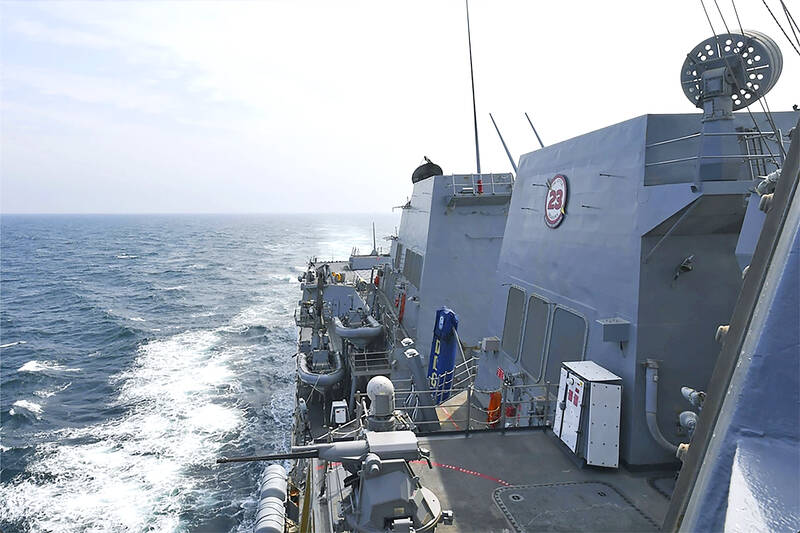The military was fully aware of an operation by the US Navy on Wednesday that involved the passage of a warship through the Taiwan Strait, the Ministry of National Defense said on Wednesday.
The US Navy’s 7th Fleet in a statement on Wednesday said that the USS Halsey “conducted a routine Taiwan Strait transit on May 8 through waters where high-seas freedoms of navigation and overflight apply in accordance with international law.”
The Arleigh Burke-class guided-missile destroyer transited through a corridor in the Strait that is “beyond the territorial sea” of any coastal state, the statement said.

Photo: US Navy via AP
“Halsey’s transit through the Taiwan Strait demonstrates the United States’ commitment to upholding freedom of navigation for all nations as a principle,” it said. “No member of the international community should be intimidated or coerced into giving up their rights and freedoms. The United States military flies, sails and operates anywhere international law allows.”
A ministry statement said that the warship entered the Taiwan Strait from the north at 7am on Wednesday, traveling southward.
The Taiwanese military was closely monitoring the surrounding sea and airspace throughout the transit, and the situation remained normal, it said.
Beijing criticized the US ship’s transit, with Chinese Navy Senior Captain Li Xi (李熹), spokesman for the Eastern Theater Command, accusing Washington of “publicly hyping” the passage.
The Eastern Theater Command “organized naval and air forces to monitor” the US ship’s transit and handle matters ”in accordance with laws and regulations,” Li said in a statement late on Wednesday.
The last such passage was on April 17, a day after US and Chinese defense chiefs held their first talks since November 2022 in an effort to reduce regional tensions.
In the 24 hours leading up to 6am yesterday, 23 Chinese military aircraft and eight naval ships were detected operating around Taiwan, the defense ministry said.
Eight of the planes crossed the median line in the Strait and entered Taiwan’s air defense identification zone, prompting Taiwan to scramble jets and put coastal missile batteries and naval craft on alert, it said.
Meanwhile, US Secretary of Commerce Gina Raimondo on Wednesday said a Chinese invasion of Taiwan and seizure of chips producer Taiwan Semiconductor Manufacturing Co (TSMC, 台積電) would be “absolutely devastating” to the US economy.
Asked at a US House of Representatives hearing about the impact, Raimondo said: “It would be absolutely devastating,” declining to comment on how or if it would happen.
“Right now, the United States buys 92 percent of its leading-edge chips from TSMC in Taiwan,” she said.
TSMC declined to comment.
A US government paper last year estimated that a major manufacturing disruption in Taiwan could lead to as high as a 59 percent increase in the US price of logic chips that domestic downstream producers would have to pay.

FIREPOWER: On top of the torpedoes, the military would procure Kestrel II anti-tank weapons systems to replace aging license-produced M72 LAW launchers Taiwan is to receive US-made Mark 48 torpedoes and training simulators over the next three years, following delays that hampered the navy’s operational readiness, the Ministry of National Defense’s latest budget proposal showed. The navy next year would acquire four training simulator systems for the torpedoes and take receipt of 14 torpedoes in 2027 and 10 torpedoes in 2028, the ministry said in its budget for the next fiscal year. The torpedoes would almost certainly be utilized in the navy’s two upgraded Chien Lung-class submarines and the indigenously developed Hai Kun, should the attack sub successfully reach operational status. US President Donald Trump

TPP RALLY: The clashes occurred near the Chiang Kai-shek Memorial Hall on Saturday at a rally to mark the anniversary of a raid on former TPP chairman Ko Wen-je People who clashed with police at a Taiwan People’s Party (TPP) rally in Taipei on Saturday would be referred to prosecutors for investigation, said the Ministry of the Interior, which oversees the National Police Agency. Taipei police had collected evidence of obstruction of public officials and coercion by “disorderly” demonstrators, as well as contraventions of the Assembly and Parade Act (集會遊行法), the ministry said in a statement on Sunday. It added that amid the “severe pushing and jostling” by some demonstrators, eight police officers were injured, including one who was sent to hospital after losing consciousness, allegedly due to heat stroke. The Taipei

NO LIVERPOOL TRIP: Taiwan’s Lin Yu-ting, who won a gold medal in the boxing at the Paris Olympics, was embroiled in controversy about her gender at that event Taiwanese boxer Lin Yu-ting (林郁婷) will not attend this year’s World Boxing Championships in Liverpool, England, due to a lack of response regarding her sex tests from the organizer, World Boxing. The national boxing association on Monday said that it had submitted all required tests to World Boxing, but had not received a response as of Monday, the departure day for the championships. It said the decision for Lin to skip the championships was made to protect its athletes, ensuring they would not travel to the UK without a guarantee of participation. Lin, who won a gold medal in the women’s 57kg boxing

The US has revoked Taiwan Semiconductor Manufacturing Co’s (TSMC, 台積電) authorization to freely ship essential gear to its main Chinese chipmaking base, potentially curtailing its production capabilities at that older-generation facility. American officials recently informed TSMC of their decision to end the Taiwanese chipmaker’s so-called validated end user (VEU) status for its Nanjing site. The action mirrors steps the US took to revoke VEU designations for China facilities owned by Samsung Electronics Co and SK Hynix Inc. The waivers are set to expire in about four months. “TSMC has received notification from the US Government that our VEU authorization for TSMC Nanjing